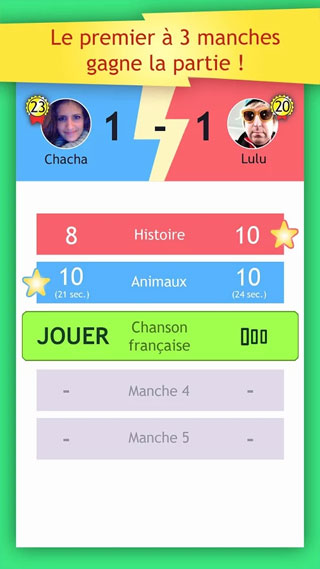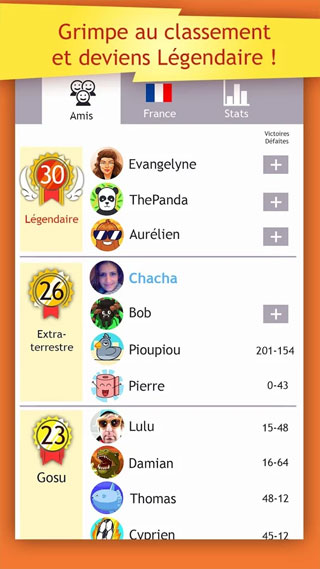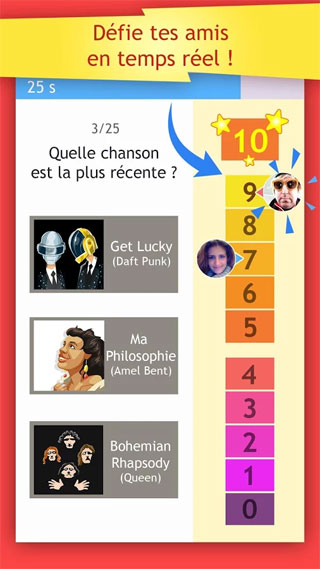Duelo
Continuing the catch-up posts of TripleFun games brings us to Permüt's sister game, Duelo.

About the game
Duelo, originally Permüt Duel, was born out of two main realisations; how people were playing Permüt, and that fact that we now had a huge database of questions and images.

In Permüt, you could play quick games with 4 other people, or invite 1-4 friends for a more personal, sensual game. Taking quick games out of the picture, the overwheming choice was 1v1. When people wanted to play with a friend, like the first part of this sentence, it was in the singular sense.
To differentiate Permüt from the other quiz apps, each of our questions was backed by a full-colour (ignore the fact that to draw something in black-and-white takes roughly the same amount of time; this just makes it sound better) picture drawn by one of our multitude of artists. The pictures would probably touch around the 1000 mark, while the questions themselves numbered over 14,000 (I know, because everytime it came to push them from the tool to the DB, it took about 15 minutes until we went and wrote custom code to get around it (ignore the fact that all code is essentially custom; this just makes it sound better)), so getting more than one use out of them is good business.
We decided to change the format a bit when developing Duelo. Now, you'd be presented with a question, and you simply had to choose the highest/best/longest/oldest/biggest/largest number. 1 question, 1 point. Miss one, and you lose your points. At certain scores, your total would bank, so you wouldn't drop below it, but in a remarkable turn of coincidence, this was were the questions got harder, and you got more choices. Weird how it works out like that.
To underline the duel(o) nature of the game, you play against your opponent in real-time, or against their shadow if they were offline. Each round has a different theme, and the best of 5 won the match.
Much simpler than Permüt, but much more exciting and tense.
Development
We were working from the Permüt codebase, so once again, our weapons of choice were Flash (Air) and Starling.

We also decided to go for a more colourful approach for the UI than Permüt's greys. Each screen was given its own primary colour (Math.random() * 0xffffff, repeat if it's black) and the rest of the UI worked around it.
Development time was around 5 months, with 100% focus for about 3 of those (the rest were taken up with coffee, baguettes and strikes). Working off the Permüt codebase meant that we could re-use a lot of the code and the base, but then again nothing is ever that simple. Nearly all of the UI was recoded, which meant it all had to be re-tested, once with the right hand, then again with the left (subtle bugs are the worst).

This was also the first Android app that we did, meaning we had to go searching for Android cousins to all those iOS-only ANEs that we were using ("just use the iOS one; we'll worry about Android when we do it, yolo"). That also brought its own worries. No longer were we coding just for iPhone 4, iPhone 4S, iPhone 5/5C/5S, iPhone 6, iPhone 6+, iPad, iPad 2, iPad Mini, iPad Mini Retina, or the iPad Air screen resolutions; now we were talking about fragmentation.
On the plus side, it meant that I could now actually play the games that we make.
All-in-all, development went smoother than Permüt, because, aside from Android, all the unknowns were now known, the technology and database were already in place, and the only major bugs were the ones I added for giggles to keep my team on their toes (benefit of being lead). As Duelo was a much more colourful app, it also meant that everybody was all smiles and japes.
Pressure pressure
The main change for Duelo was the in-game flow (thankfully we dropped the name Permüt Duel, I'd like to think mainly because it's a right douleur dans le cul to write umlaut's in HTML, 5 or otherwise). Even though the questions were simpler, the tight time-limit, mixed with seeing your opponent play in (quasi)real-time, meant that each round was a tense affair. The further you progress, the more you have to lose, as one wrong answer will kill your lead.

Just before each palier - where your score would be saved - we added an extra card to the answers, which adds a lovely little bit of nervousness to the affair. In the event of a tied score, the person that finished quickest would take the round.
Each person would take turns choosing the theme of the round, from a random pick of 3. If the game was still tied after 4 rounds, then Professor Duelo, using some incredibly complex AI, would choose the final theme. If the game was still tied after that round, then someone cheated, because we didn't code that in.
Play Duelo
Duelo is available NOW (*cough* if you speak French *cough*) on both iOS and Android. Below you can enjoy a 22 second clip of the game in action. Why 22 seconds? I have no idea, I wasn't there that day.
Comments
Submit a comment